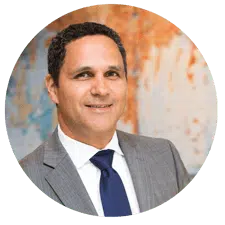
Edmond Fhima
Financial Planner
Your Last Will & Testament:
The 5 W’s of Estate Planning
Estate planning often conjures up stressful feelings. Many people say to themselves, “I’ll get around to it when I have time.” Sound familiar? You’re not alone. Yet getting it done provides a sense of relief and peace of mind that will make you wonder why you ever waited so long. Knowing that your estate will be passed on to your heirs according to your final wishes, entrusted to one or several individuals to handle its administration and minimize tax will leave you feeling empowered.
Who are your executors/trustees and beneficiaries?
Choosing your executors (or liquidators in Quebec) to carry out your final wishes may not be as simple as it might seem. Careful thought should be given to make sure that you have the right person to take on these responsibilities. From making funeral arrangements to ensuring final tax returns are filed in a timely fashion before the distribution of your estate, the list is long! Equally, the choice of trustees, those who will administer the estate on behalf of the beneficiaries until final distribution cannot be overlooked. Often the role of a trustee (or replacement trustee) can carry on for several years, so the age of trustees may also be a consideration. Having a properly drafted will takes care of the 5 W’s of estate planning. Who, What, Where, When and Why. Whether your estate is simple or complex, each one of these questions must be answered.
Today, the division of estates among reconstituted families (from different marriages) can lead to unwanted consequences. Without proper analysis of the family’s situation, your estate may unknowingly favour the new family over your natural children. Improper planning may also see one beneficiary paying the taxes on certain assets while other beneficiaries receive assets free of tax simply because of improper planning.
What assets are you gifting?
Are they of a taxable or tax freenature? Are they moveable or immovable assets? Are they liquid or illiquid? Are they subject to probate? There are several planning techniques to deal with each question. Entrepreneurs face an even bigger challenge when planning for the succession of their business. It may be that the business value is divided equally among surviving heirs, but how do you deal with a child who has been involved in the operation and success of the family business? Does your estate plan deal with the possibility of double taxation at death? These are important questions that need reflection and advanced estate planning. A legal professional will provide you with a tailored will that deals with these assets.
Knowing that your estate will be passed on to your heirs according to your final wishes, entrusted to one or several individuals to handle its administration and minimize tax will leave you feeling empowered.
Where the assets are located may also lead to other estate tax considerations.
While there is no estate tax in Canada, U.S. situs assets or assets in other foreign jurisdictions may be subject to estate taxes in those jurisdictions. Understanding the estate tax consequences in foreign jurisdictions should also be part of your estate plan. It may be advisable to have a separate will to deal with assets in foreign jurisdictions and seek advice from legal professionals in those jurisdictions.
When should your estate be distributed?
Do you have concerns about certain heirs receiving their share of your estate immediately? The most common situation involves minor beneficiaries, however other situations may exist prompting you to delay distribution at death. From second marriages where the intent is to protect the capital for your natural children to children with a troubled situation, timing can be a factor.
From the executor’s (or liquidator’s) perspective, the estate should only be distributed once all debts and taxes are filed and clearance certificates are filed and approved from tax authorities. Otherwise, they can be held personally responsible for unpaid taxes. This can be a problem when the estate has already been distributed to several heirs.
Why should you draft a legal will?
This should be the first question asked! While the previous answers to who, what, where and when should be sufficient to convince you, dying without a will or intestate may result in seeing your estate distributed according to the laws of intestacy which are governed by the jurisdiction you reside in at death. You may not like the possible outcome and leave your estate exposed to unnecessary taxes! You are better to take control by drafting a will yourself.
Ask your team at Tulett, Matthews & Assoc. how we can help get your last will & testament reviewed to ensure that it accurately reflects your intentions.
* While this article tries to address several issues involved in properly drafting a will, it is not meant as legal advice. It is essential that you seek advice from a legal professional who can guide you through the process of making the proper decisions in preparing your last will and testament